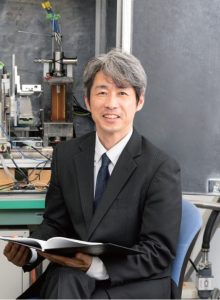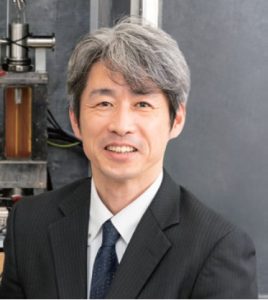

SUZUKI, Shinsuke
Professor, Doctor of Engineering
Today is an age of drastic transformation in the energy industry and transportation technologies. Mechanical science plays a crucial role in these fields. To address numerous challenges effectively, a comprehensive understanding of engineering relating to environmental, energy, information, biological, and safety aspects is essential. Through active application of this knowledge, there is a continuous pursuit of refining scientific techniques and fostering technological innovation. Moreover, to enrich human life, experts in mechanical science bear the responsibility to actively engage in international regulations and contribute recommendations from a scientific and technological standpoint. The Department of Applied Mechanics and Aerospace Engineering aims to impart a broad foundation in mechanical science, integrating natural sciences and engineering, to cultivate individuals capable of creating new scientific values and contributing to technological innovation, thereby making significant societal contributions.
On reorganization of the Faculty of Science and Engineering in 2007, the Department of Applied Mechanics and Aerospace Engineering became independent from the former the Department of Mechanical Engineering. The former Department of Mechanical Engineering was established as the first cornerstone of industrial science and technology within the former Faculty of Science and Engineering. The term “”Applied Mechanics”” in the department’s name reflects the application of physical laws, particularly mechanics, to mechanical engineering. The latter part, “”Aerospace Engineering,”” symbolizes the pinnacle of sophisticated technologies in mechanical science. Additionally, the historical significance of reintroducing the aerospace name derives from the wartime existence of the Aeronautical Engineering department within the university.
In this department, students acquire a solid foundation rooted in long-standing traditions while building cutting-edge knowledge upon it. In the second and third years, students primarily study specialized subjects such as material mechanics, fluid mechanics, thermodynamics, dynamics, and applied mathematics. Practical skills are further honed through mechanical science and aerospace experiments, as well as drafting and exercises.
Starting from the fall semester of the third year (Applicable from students entering in 2023), students are assigned to research laboratories in one of the following departments: thermal fluid sciences, mechanics and applied mathematics, systems and environmental energy, materials design and processing, or functional design and microengineering. In the fourth year, students engage in thesis research.
The department offers opportunities for interdisciplinary research in various fields such as information technology, materials science, life sciences, and applied mathematics based on students’ interests and motivation. If you are unsure about which department to choose, this department is a very strong candidate for you.
We are living in an age of drastic transformation in the energy industry and transportation technologies. In both fields, mechanical engineering plays a crucial role. Rules and standards are now being established not only domestically but also internationally. However, these are not always decided from a purely scientific and technological perspective. Therefore, developing beneficial technologies alone does not guarantee their global adoption. We hope that students studying in this department will utilize well-founded scientific and technological knowledge and data to communicate globally, engage in discussions, and lead humanity toward a prosperous society.
Merely following rules decided by others without understanding or agreement does not ensure sustainable technological development. Waseda students confidently raise their hands to ask precise questions and express opinions in academic discussions and international conferences. This embodies the vigor of Waseda students. We have high expectations for this. In this department, students will develop the ability to think logically from sufficient foundational knowledge, make their own judgments, summarize opinions, and engage in discussions with others. Regarding future career paths, rather than following paths chosen by others, let us choose paths that suit ourselves. With a broad perspective, a bright future should unfold.
I am conducting research to create materials with excellent properties by melting, solidifying, and deforming metallic materials. These materials are intended for applications in automobiles, aircraft, spacecraft and so on. Additionally, I study the properties of molten metals and the crystallization process in microgravity environments in space. What I find most enjoyable in advancing my research is how discussions expand in a positive direction, forming new collaborations, and witnessing students and young researchers working together, their eyes shining with enthusiasm and growth.
Here is an example of my research: In a collaborative study, we discovered that by mixing another powder with titanium alloy powder using a metal 3D printer, the resulting crystals in the material become finer during solidification, thereby enhancing its strength. When considering mechanisms to refine crystals, I conceived the idea of conducting experiments in space where melting and solidification can occur without contamination from containers, allowing for clean experiments. Subsequently, we applied for and successfully passed rigorous evaluations to conduct experiments aboard the International Space Station (ISS).
Collaborating with outstanding experts from various related fields, we pooled our knowledge, conducted planning, and preliminary experiments. This required mobilizing the academic knowledge we had accumulated over the years. Later, we discovered pores in the prepared sample, rendering it unsuitable for space experiments just before the scheduled launch aboard Cygnus NG17 rocket of Northrop Grumman in the summer of 2022. However, thanks to the assistance from JAXA, who mentioned “there is another opportunity in the fall,” we had a little more time. We promptly identified the cause for generation of pores, devised a solution, and successfully resolved the problem with the sample.
Such setbacks are part of the thrill of research, where overcoming challenges becomes an integral part of the journey. When a student presented their solution for the pores at a conference, she received a high praise. The experiment was eventually launched aboard Falcon 9 on the Dragon CRS Sp-X26 of SpaceX resupply mission to the ISS in autumn 2022, achieving success in spring 2023. Despite the operation being remotely controlled by staff at the Tsukuba Space Center, students took charge, overseeing procedure writing, on-site signaling, and data compilation. They even designed mission logos and T-shirts in an atmosphere similar to a university festival club event.
As I write this interview article, every day brings news that rewrite the history of space development. SpaceX has successfully launched and landed its massive Starship rocket, developed with the goal of sending humans to the Moon and Mars. Around the same time, Boeing sent astronauts to the International Space Station (ISS) for the first time aboard the Starliner spacecraft. This marks the second major achievement by a private company following SpaceX. In Japan, the lunar probe SLIM has successfully landed on the Moon, and the H3 rocket has been successfully launched into space.
A Japanese astronaut, Dr. Wakata retired from JAXA and became an astronaut at the U.S. private company Axiom Space. We have entered an era where students in our laboratory conduct thesis research and experiments on the ISS using private rockets. By the time you read this article, these events may already seem outdated, with even more remarkable developments underway.
Looking ahead, the privatization of space development and utilization is advancing rapidly. Your contributions in this field are highly anticipated. We encourage you to find a path where you can pursue your dreams without being bound by the trends of the time or existing companies.
 This applies to all fields, but in many technological developments, international cooperation is increasingly becoming essential. It is important for students to cultivate an international perspective during their academic years. While studying abroad is beneficial, opportunities exist even within our university. In graduate school, you may have opportunities for collaborative research abroad or attend international conferences.
This applies to all fields, but in many technological developments, international cooperation is increasingly becoming essential. It is important for students to cultivate an international perspective during their academic years. While studying abroad is beneficial, opportunities exist even within our university. In graduate school, you may have opportunities for collaborative research abroad or attend international conferences.
One important realization from interactions with people from other countries is that many corporate engineers and researchers hold doctoral degrees. Without a doctoral degree, you may not be able to participate in crucial technology negotiations in many cases. Therefore, many Japanese companies prioritize hiring engineers and researchers with doctoral degrees. As globalization progresses, it is important to be aware that we are entering an era where doctoral degrees hold significant value in career decisions.
In the Department of Applied Mechanics and Aerospace Engineering, we provide strong support for students pursuing international activities and aiming for doctoral degrees.